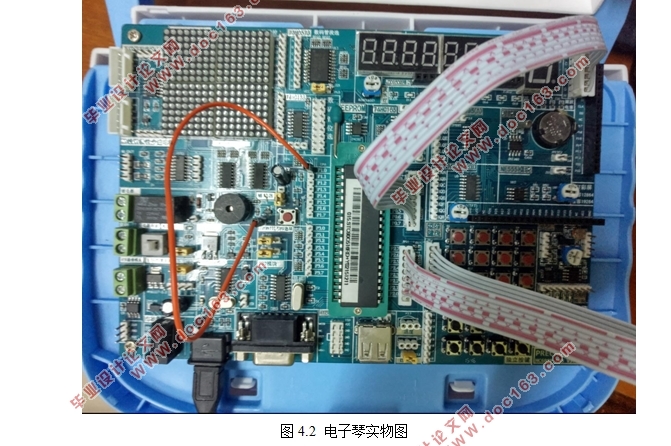基于单片机的微型电子琴的实现

1.无需注册登录,支付后按照提示操作即可获取该资料.
2.资料以网页介绍的为准,下载后不会有水印.资料仅供学习参考之用.
密 惠 保
基于单片机的微型电子琴的实现(任务书,开题报告,外文翻译,论文12000字)
摘 要
随着科技的创新,电子琴的发展越来越成熟,电子琴俨然成为新时代音乐的主流,不仅如此,电子琴在其微型化和多功能化方面极具研究价值,而且在玩具市场具有广阔的发展前景。
本次设计实现了一种微型电子琴,其主要包括演奏、显示和复位功能。整个设计主要以单片机为核心,外加按键、显示以及音频放大模块构建硬件电路,并在此基础上完成了相应软件的设计。设计过程中主要通过按键控制改变单片机内部的定时/计数器T0的数值,使其产生不同频率的脉冲信号,从而产生不同的音阶。通过事先设定好的延时,控制音符发声的时间,以此形成节拍,实现微型电子琴的演奏。
该电子琴能够根据用户的需要发出不同的音符,具备实现多功能、扩展性强、系统安全稳定等特点。
关键词:单片机;微型电子琴;音阶
Abstract
With the innovation of science and technology,the electronic organ has been more and more mature,becoming the main style of music in new era. Besides,there is great potential in the miniaturization and multifunction of electronic organ, especially in toy market. [资料来源:http://THINK58.com]
This design realized several functions of electronic organ, such as performing, displaying and resetting. It is mainly based on MCU, with buttons, screens and audio amplifier attached to build hardware circuit. With hardware circuit designed, software is also ready for the complete design. The MCU controls the change of inner timer and counter T0 by buttons to produce pulse signals of different frequencies so that distinctive musical scales can be realized. By setting time delay before performing to control sounding time, the beats of music are produced to achieve the performance of electronic organ.
The electronic organ can produce different notes according to the needs of users, with the characteristics of multifunction realizing, strong extensibility and safety and stability of system.
Key Words:MCU; electronic organ; scale
[资料来源:http://www.THINK58.com]

目 录
第1章 绪论 1
1.1 研究背景及意义 1
1.2 电子琴的发展历程 2
1.3论文主要内容及章节安排 3
第2章 微型电子琴原理及系统分析 4
2.1 电子琴的基本原理 4
2.1.1 音阶 4
2.1.2 音拍 4
2.1.3 音源 5
2.2 系统分析 6
2.2.1 系统功能分析 6
2.2.2 系统模块分析 6
2.2.3 系统硬件分析 7
2.3本章小结 8
第3章 系统设计 9
3.1 设计原理 9
3.2 系统组成 9
3.3 模块电路设计 10 [资料来源:http://THINK58.com]
3.3.1 起振电路模块 10
3.3.2 按键电路模块 10
3.3.3 音频播放电路模块 11
3.3.4 供电及复位电路模块 12
3.3.5 数码管显示模块 12
3.4本章小结 14
第4章 系统仿真与调试 15
4.1 电路仿真 15
4.2 实物图 16
4.3 系统调试 16
4.3.1软件仿真调试 17
4.3.2 系统硬件调试 17
4.4本章小结 18
第5章 结论 19
参考文献 20
附 录 21
致 谢 23 [资料来源:THINK58.com]
